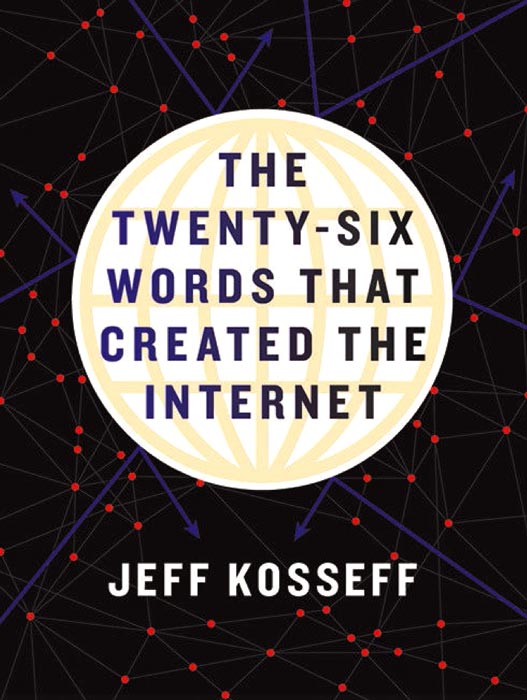 The Twenty-Six Words That Created the Internet The Twenty-Six Words That Created the Internet
Jeff Kosseff
Narrated by Douglas R. Pratt
Available from Audible
Book published by Cornell University Press
Did you know that these twenty-six words are responsible for much of America's multibillion-dollar online industry? What we can and cannot write, say, and do online is based on just one law—a law that protects online services from lawsuits based on user content. Jeff Kosseff exposes the workings of Section 230 of the Communications Decency Act, which has lived mostly in the shadows since its enshrinement in 1996. Because many segments of American society now exist largely online, Kosseff argues that we need to understand and pay attention to what Section 230 really means and how it affects what we like, share, and comment upon every day.
The Twenty-Six Words That Created the Internet tells the story of the institutions that flourished as a result of this powerful statute. It introduces us to those who created the law, those who advocated for it, and those involved in some of the most prominent cases decided under the law. Kosseff assesses the law that has facilitated freedom of online speech, trolling, and much more. His keen eye for the law, combined with his background as an award-winning journalist, demystifies a statute that affects all our lives –for good and for ill. While Section 230 may be imperfect and in need of refinement, Kosseff maintains that it is necessary to foster free speech and innovation.
Jeff Kosseff is Assistant Professor in the US Naval Academy's Cyber Science department, where he teaches cybersecurity law. He has practiced technology and First Amendment law, and clerked for Judges Milan D. Smith, Jr. of the US Court of Appeals for the Ninth Circuit, and Leonie M. Brinkema of the US District Court for the Eastern District Court of Virginia. He was a finalist for the Pulitzer Prize for National Reporting and the recipient of the George Polk Award in National Reporting.
REVIEWS:
“Kosseff's book is timely, given the intensifying debate about whether Congress should find ways to hold Internet companies accountable for third-party speech that harms individuals and society as a whole. But the book's value goes beyond timing. The author's background as a journalist and his current roles as a professor and a lawyer enable him to produce an engaging narrative that explains the law clearly and compels us to think about speech in the modern age and who is responsible when it is harmful.”
—The Washington Post “Most people benefit from Section 230 every hour, but are unaware it even exists. Jeff Kosseff's new book provides the first-ever comprehensive history of this monumentally important law. The book's lucid and reader-friendly style will fully engage Section 230 newcomers; while the book's many never-before-publicized details will enlighten Section 230 enthusiasts.”
—Eric Goldman, Santa Clara University “This book is important and timely. Kosseff clearly and concisely explains the complicated history of Section 230, and how its 'safe harbor' created the internet as we know it today. But he also acknowledges that Section 230 can shield terrible crimes and impose other social costs that we must mitigate.”
—Brian L. Frye, University of Kentucky “Jeff Kosseff's behind-the-scenes reportage spotlights the foundational law, Section 230, that made the modern internet possible. Kosseff emphasizes the law's boundless virtues and just as helpfully acknowledges its occasional weaknesses. He shows how 230 has shaped an internet that empowers everyone to speak freely, to hold governments and powerful private actors accountable, and to build the next Facebook, Google, or Wikipedia.”
—Mike Godwin, R Street Institute “Jeff Kosseff's richly detailed history of Section 230 is a gift to anyone seeking to understand how the Internet became what it is, what it could have been, and what it could be.”
—Mary Anne Franks, Cyber Civil Rights Initiative, author of The Cult of the Constitution “A comprehensive, thoughtful and greatly needed treatment of the the law that gave birth to the internet as we know it. This book is bound to shape the conversation about the nature of online activity for years to come.”
— Joseph E. Kennedy, University of North Carolina School of Law “Jeff Kosseff's latest is essential reading. His deft and insightful work chronicles the unexpected tale of how just twenty-six words in the Communications Decency Act of 1996 changed online speech forever. All thoughtful lawmakers, tech executives, and concerned citizens need to grapple with how we got here.”
—Cyrus Farivar, author of Habeas Data “The Twenty Six Words that Created the Internet provides a timely reminder that the questions we now face about platforms, speech, and harm are not new. A combination of detective work, investigative journalism, and historical documentation, Kosseff's book is frank about the law's shortcomings even as it is persuasive about its overall value.”
—Daphne Keller, Stanford Center for Internet and Society
|

